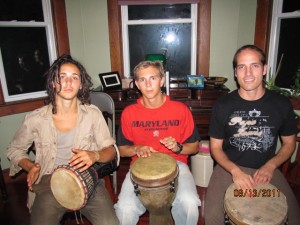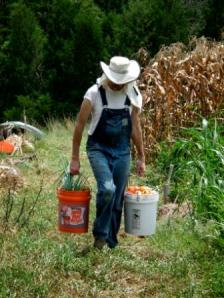
We should all strive to make our homes into real places of refuge, by cultivating an atmosphere of love, openness, and security.
As I write this, I am sitting on a bus. It’s a nice bus, a Greyhound, not a third-world bus that seems to be falling apart. We are leaving behind Virginia and my family, leaving behind the home I spent at least a few years in as I was growing up.
Rabbi Ben and I don’t have a home of our own (unless you count our backpacks – we travel like turtles!) so our parents’ homes are a bit like places of refuge for us. If, G-d forbid, something happened and we had nowhere left to go, we would have somewhere to turn. I think this is true even for those of us who aren’t traveling: if something happened, at the very least we can turn to our families for support. (At least, this is the way it should be, ideally.) Our family is our place of refuge.
This week’s Torah portion has a stunning lineup of commandments the Jews are reminded about just before Moses dies. One of these is the concept of cities of refuge. If one person accidentally kills another, he must run to the nearest city of refuge so that he will not be killed by the vengeful family. The Jews are even obligated to put up clear signposts telling the person exactly where to run to get to the nearest city of refuge.
Now, I’m not suggesting that if you accidentally kill someone you should go running to your house (you probably should go to the police)… And you should probably visit your parents even when you haven’t done anything wrong. Yet, we all make mistakes in our life. And when we do, we need somewhere to run. Even if nobody is pursuing us, we need to know we have a safe place to go to. (Haven’t you ever had a bad experience and just felt that “I want to go home and hide” feeling?) Not only do we need a safe place, but we need clear instructions on how to get there, every step of the way, because when we’re feeling terrible about what we’ve done, the mistake we’ve made, we might not be thinking too clearly.
When I’m traveling, I feel comfortable just knowing I have somewhere to go if I ever really need it. It’s an important lesson on the value of family, trust, and support. Everybody needs to know that they have a ‘city of refuge’ – even though we hope to never have to use it.
As we move into the coming week, let’s focus on making ourselves and our homes into cities of refuge for our friends and family. I hope that when something happens to my loved ones, they feel like they can run to me… Even while at the same time, I hope they won’t need to use it. Still, if we focus on making our homes safer and more accessible, we and our families stand to benefit by growing together, growing stronger, and growing closer.
Shabbat shalom!
Read More
 Yesterday we went to Kayam Farms for a Tu B’Av celebration. It reminded us a lot of Eden Village Camp. Kayam Farms are associated with Milldale, a Jewish day camp and Pearlstone, a kosher conference center.
Yesterday we went to Kayam Farms for a Tu B’Av celebration. It reminded us a lot of Eden Village Camp. Kayam Farms are associated with Milldale, a Jewish day camp and Pearlstone, a kosher conference center.









